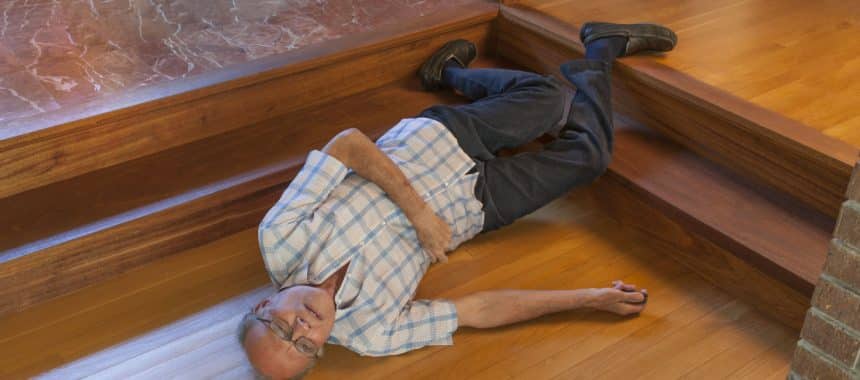Who’s Liable for an Injury on Private Property in Georgia?
Injury on private property in Georgia can happen anywhere—on sidewalks, in someone’s home, or at a local business. Slip and fall accidents are more common than many people think. According to the Georgia Department of Public Health’s Injury Prevention Program, falls are a leading cause of unintentional injury across the state. That makes it even more important to understand your legal rights when injured on private property.
These incidents can occur in grocery stores, apartment complexes, parking lots, or even private homes. In Georgia, understanding who may be legally responsible for such accidents is key to protecting your rights and securing fair compensation.
But when an injury occurs on private property, one question often arises: Who’s responsible? In Georgia, premises liability law governs these situations and helps determine who may be held legally accountable.
Understanding Premises Liability in Georgia
Premises liability refers to a property owner’s legal responsibility to maintain a safe environment for visitors. Under Georgia law (O.C.G.A. § 51-3-1), property owners and occupiers have a duty to exercise “ordinary care” in keeping their premises safe for invitees—those lawfully on their property.
- Fixing known hazards
- Warning guests of potential dangers
- Performing regular inspections
When a property owner fails to uphold this duty and someone is injured, they can be held liable for the damages.
Types of Property Visitors: Why It Matters
In Georgia, the level of care a property owner owes depends on the legal status of the injured person:
1. Invitee
Someone who is invited onto the property for a lawful purpose, such as a customer in a store or a guest at an event. Property owners owe the highest duty of care to invitees.
2. Licensee
A person who enters the property for their own purposes, such as a social guest. The owner must avoid “willful or wanton” injury to licensees.
3. Trespasser
Someone who enters without permission. Owners generally owe little duty to trespassers, except not to intentionally harm them.
Common Types of Private Property Accidents
Here are some examples of injuries that can happen on private property where liability may be an issue:
- Slip and falls on wet floors, loose rugs, or icy sidewalks
- Trip and falls due to uneven pavement or broken stairs
- Swimming pool accidents in backyard or neighborhood pools
- Dog bites or other animal-related injuries
- Inadequate security leading to assaults or theft
- Falling objects from poorly maintained shelves or structures
Each of these incidents can lead to serious injuries like fractures, concussions, spinal damage, or worse.
Determining Fault for Injury on Private Property in Georgia
To successfully bring a premises liability claim in Georgia, you must show:
- The owner knew or should have known about the hazardous condition
- The owner failed to take reasonable steps to fix or warn about it
- Your injury was directly caused by the hazardous condition
- You were lawfully on the property
Georgia follows a modified comparative negligence rule, meaning if you are 50% or more at fault, you cannot recover damages.
Can Homeowners Be Held Liable?
Yes. Even private homeowners can be held responsible for injuries that occur on their property. This includes:
- Poor lighting on walkways
- Loose railings or stairs
- Hidden holes or obstacles in the yard
- Wet floors during gatherings or parties
What If the Property Is Rented?
In rental situations, liability can become more complex. Depending on the circumstances, either the landlord or the tenant (or both) may be responsible. Generally:
- Landlords are responsible for structural safety and common areas (e.g., hallways, stairwells).
- Tenants are responsible for areas under their control (e.g., inside their apartment).
Steps to Take After an Injury on Private Property
If you’ve been hurt, these steps can help protect your rights:
- Report the incident to the property owner or manager immediately.
- Document the scene—take photos, gather witness info, and write down what happened.
- Seek medical attention, even for seemingly minor injuries.
- Avoid giving recorded statements to insurers before speaking with a lawyer.
- Consult a personal injury attorney experienced in Georgia premises liability law.
How Much Is a Premises Liability Case Worth?
The value of your case depends on several factors, including:
- Severity of your injuries
- Medical costs (past and future)
- Lost wages
- Pain and suffering
- Whether the owner acted with gross negligence
Statute of Limitations in Georgia
In Georgia, the statute of limitations for personal injury claims—including premises liability—is two years from the date of the injury. Missing this deadline usually means losing the right to recover compensation.
Final Thoughts
Injuries on private property in Georgia happen every day, but victims often don’t know they have legal rights. Property owners—whether homeowners, landlords, or business operators—have a duty to keep their premises reasonably safe. When they fail, and someone gets hurt, they can be held legally and financially responsible.
If you were injured on someone else’s property, don’t wait. Reach out to a personal injury lawyer who understands Georgia law and can help you seek the compensation you deserve.
Call McManes Law for a Free Consultation
At McManes Law, we have years of experience handling personal injury cases throughout Atlanta and Alpharetta. If you’ve been injured on private property, contact us today to schedule your free case review. Call 770-645-8801 or fill out our online form.
Let us help you hold negligent property owners accountable.


Great post! The way you explained the topic was simple yet impactful. Really appreciate the clarity and effort you put into it.